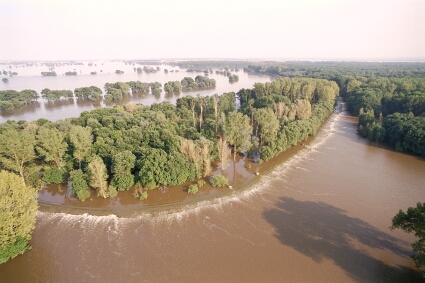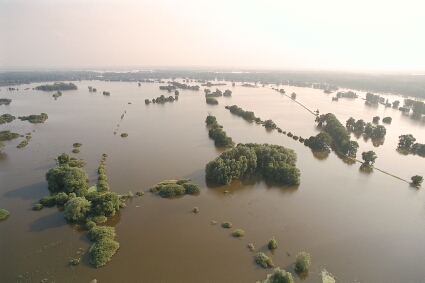Floodplain habitats after extreme flood events; impact of the Elbe flood 2002 on flora and fauna
Project leader:Prof. Dr. Klaus Henle
Coordination: Dipl. Ing. Mathias Scholz
Project staff: Dr. Judith Gläser, Dr. Christiane Ilg, Dr. Michael Gerisch, Dipl.-Geogr. Franziska Loeffler,
Status: Funded by the Bundesanstalt für Gewässerkunde and UFZ
Funded period: 01. March 2003 to 31. December 2008
HABEX; a unique natural experiment
The extreme flooding events in the Elbe River in August 2002 and winter 2002/03 as well as the extreme drought in summer 2003 have attracted international attention (e.g. Mudelsee et al. 2003 in NATURE 425, 166-169).

The impact of these extreme events on flora and fauna and the effects for ecosystem functioning in general are difficult to predict. This Elbe flood has a recurrence interval of 176 years. Within the HABEX-Project we will use this chance to study the short-and long-term impact of such extreme disturbances on floodplain flora and fauna.

The project will take advantage of the standardised study design developed and data collected by the RIVA project. The predecessing RIVA project (Development of a Robust Generally Applicable Indicator System for Ecological Changes in Flood Plain Systems: funded by the German Ministry of Education and Research, Coordination UFZ, 1997-2001).
The well-established and geo-referenced plot-survey design of the RIVA project enables the repeated survey of the same plots for flora and vegetation, carabid beetles, and molluscs for riverine grasslands of the Middle Elbe. This data set will allow comparisons of floodplain communities before and after the extreme events. Multivariate statistic analyses will set the basis for the refinement of the already existing indication and prognostic models.
Project objectives
- Analysis of the effects of the extreme flood on communities (vegetation, carabid beetles, molluscs)
- Role of life history traits for the differential reaction of species to extreme floods
- Assessment of functional relationships between species and abiotic site conditions under extreme flood events
- Verification of the existing knowledge on the RIVA indication system
- Testing and improving indication and prognostic models under extreme events (INFORM)
- Implementation of models (INFORM) in decision support tools for administration
- BfG - Bundesanstalt für Gewässerkunde Koblenz
- ÖKON - Gesellschaft für Landschaftsökologie Gewässerbiologie Umweltplanung mbH Regensburg, Francis Foeckler
- ILN - Institut für Landschaftsökologie und Naturschutz-Bühl, Arno Schanowski
Project partner
top
